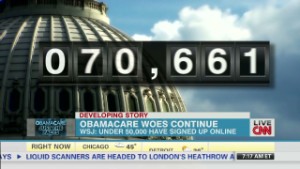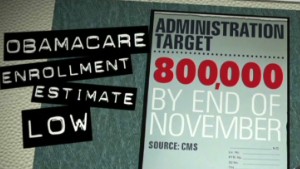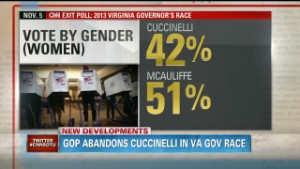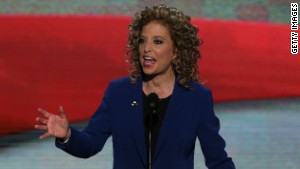- Obama administration says enrollment figures not yet final, plans to release them this week
- Administration says it may allow people to bypass the exchanges website for enrollment
- Wall Street Journal reports figure for online enrollment on HealthCare.gov
- NEW: Obama agrees with Bill Clinton that he should take steps to help people keep plans
Washington (CNN) -- The wait for Obamacare enrollment numbers is going to be a little bit longer. The Obama administration is expected to release them by the end of this week but has yet to say exactly when.
The administration is lowering expectations, cautioning the numbers "will be lower than we hoped and we anticipated," White House spokesman Jay Carney said on Tuesday.
It is blaming a faulty federally run website that is hindering the ability of consumers to sign up for coverage.








"We are working 24-7 to ensure that the site is working smoothly for the vast majority of users by the end of November," said Chris Jennings, deputy assistant to the President for health policy.
Unofficial numbers have been calculated, however, and it is estimated that 50,000 people successfully signed up for health coverage through the federal Obamacare website, HealthCare.gov, during the first five weeks of open enrollment, the Wall Street Journal reported on Monday.
That number falls well short of expectations for the period.
A similar number of people have also signed up and made a first payment on marketplaces run by a number of states, according to a CNN analysis.
Also, hundreds of thousands of people have signed up for coverage but not yet completed the enrollment process.
Consumers have until December 15 to submit payment for coverage that begins January 1. The overall sign-up deadline for 2014 is next March 31.
Work-arounds
For the program to work, millions must purchase coverage on insurance exchanges offered through the HealthCare.gov website or through a number of states.
A key part is attracting young and healthy participants into the pool of those paying premiums to lower overall costs of providing care.
Young coders build health-care website in days
And with the first month plagued by problems with Healthcare.gov, the administration is considering alternatives, including allowing people to bypass it and sign up directly through insurance companies.
"We are also continuing to pursue additional avenues by which people can enroll, such as direct enrollment through insurance companies, that will help meet pent-up demand," Jennings said.
The federal online application process has been marked so far by serious technical problems.
The website was established as the main source of public information and the primary way for consumers to purchase private insurance online under the Affordable Care Act, President Barack Obama's signature domestic policy achievement.
Obamacare's other problem
The online enrollment debacle, combined with some people losing their health insurance because of Obamacare, has energized Republicans, who have hammered Obama politically and see the rocky start as a potent campaign issue heading into next year's congressional midterm elections.
Former President Bill Clinton might have just added more fuel to critics' fire. He said the President should "let [people] keep what they've got," referring to people's existing insurance plans being canceled.
"I personally believe, even if it takes a change in the law, the president should honor the commitment the federal government made to those people and let them keep what they've got," Clinton said during an interview with the website OZY.com.
Clinton: Obama should 'honor commitment' on keeping health plans
President Obama recently apologized for repeatedly saying that people who like their health insurance plans can keep them.
Obama agrees with Clinton's assessment, White House Press Secretary Jay Carney said Tuesday.
The President "has pledged to task his team" to find solutions for people who have lost their plans despite assurances made before the law's passage, Carney told reporters.
Sen. Richard Durbin, D-Illinois, said Obama should have been more careful with his words in the first place.
"A couple more sentences added would clarify it," the Senate's second-highest Democrat said on CNN's "Newsroom" with Ashleigh Banfield. "The president apologized. He said very clearly he was sorry if he misled people."
Durbin also said that Republicans and Democrats "need to be open to constructive changes to make this law work better."
Lowering expectations
Joanne Peters, a spokeswoman for the Health and Human Services Department, declined to discuss enrollment specifics in responding to the Journal report, which cited unnamed sources familiar with the matter.
"We cannot confirm these numbers," Peters said.
"More generally, we have always anticipated that initial enrollment numbers would be low and increase over time, just as was the experience in Massachusetts, where only 0.3%, or 123 people paying premiums, enrolled in the first month," she said of a similar program set up in the Bay State in 2006.
"And, as we have said, the problems with the website will cause the numbers to be lower than initially anticipated," Peters said.
A senior administration official, speaking to CNN on the condition of anonymity, said the numbers reported by the Journal were not official and that final official data for the first month of open enrollment is not ready yet.
The Journal's figure is pegged to "834 transmissions" received by insurance companies to complete enrollments. The 834 refers to the code for the final step in the HealthCare.gov process, when all the data entered is sent to the insurance company a user has chosen. The Journal reported private health plans had received federal enrollment information for 40,000 to 50,000 users.
With elections looming, Obamacare rattling Democratic nerves
Marilyn Tavenner, the official charged with implementing Obamacare as director of the Centers for Medicare and Medicaid Services, told lawmakers last week the administration had hoped to enroll 800,000 on the insurance exchanges by the end of November.
That figure would presumably include both the exchanges run by the federal government and those run independently in 14 states and the District of Columbia.
It is not clear if it also included enrollments for a large expansion of Medicaid meant to provide insurance to more low-income Americans.
Enrollment
It depends. Many insurance companies and state-based exchanges don't classify customers as officially enrolled until they've paid their first premium. Others will count people as enrolled once they've selected a plan. Department of Health and Human Services officials haven't defined what metrics they'll use to determine enrollment. Since payment isn't required until December 15, it is possible many consumers may select a plan and then wait to pay at a later date.
According to CNN's estimates, at least 344,808 people had signed up for new private insurance on state-based exchanges as of November 11.
This number includes 59,441 people who have both selected a plan and made an initial payment, as well as nearly 290,000 people who've selected a plan but have yet to pay. This figure does not include paper applications or those submitted over the phone.
Consumer habits could partially explain why so few people have completed the enrollment process.
"You shouldn't pay anything until the very last moment. You're better off keeping the money than giving it to someone else," Michael McCall, consumer psychology professor at Ithaca College, said. He likened it to paying rent or a mortgage when it's due, rather than before a bill is received.
He added that until payment is submitted, the door remains open to back out or make changes.
"Once I pay I've kind of made that commitment," McCall added.
CNN's Jim Acosta, Leigh Ann Caldwell, Adam Aigner-Treworgy and Z. Byron Wolf contributed to this report.
